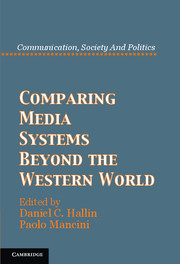Book contents
- Frontmatter
- Contents
- Contributors
- 1 Introduction
- Part I Cases
- 2 The Impact of National Security on the Development of Media Systems
- 3 Italianization (or Mediterraneanization) of the Polish Media System?
- 4 Culture as a Guide in Theoretical Explorations of Baltic Media
- 5 On Models and Margins
- 6 Africanizing Three Models of Media and Politics
- 7 The Russian Media Model in the Context of Post-Soviet Dynamics
- 8 Understanding China's Media System in a World Historical Context
- Part II Methods and Approaches
- References
- Index
8 - Understanding China's Media System in a World Historical Context
from Part I - Cases
Published online by Cambridge University Press: 05 June 2012
- Frontmatter
- Contents
- Contributors
- 1 Introduction
- Part I Cases
- 2 The Impact of National Security on the Development of Media Systems
- 3 Italianization (or Mediterraneanization) of the Polish Media System?
- 4 Culture as a Guide in Theoretical Explorations of Baltic Media
- 5 On Models and Margins
- 6 Africanizing Three Models of Media and Politics
- 7 The Russian Media Model in the Context of Post-Soviet Dynamics
- 8 Understanding China's Media System in a World Historical Context
- Part II Methods and Approaches
- References
- Index
Summary
If Hallin and Mancini's comparison of media systems in the developed capitalist democracies of Western Europe and North America is based on a “most similar systems” design (2004b: 6), to bring in the Chinese media system into a worldwide comparative project is to bring one of the “most dissimilar systems” into the messy picture of non-Western empirical reality. Moreover, although I share Hallin and Mancini's desire to give a long overdue “decent burial” to Four Theories of the Press, which they characterized as a “horror-movie zombie” that “has stalked the landscape of media studies…for decades beyond its nature lifetime” (2004b: 10), to give today's Chinese media system a decent depiction compels me to exhume at least parts of the skeleton of Four Theories as starting points. I do so even though I immediately realize the unpleasant and discomforting nature of such an exercise and even though I agree with the now well-established critiques of Four Theories as a case of Cold War–tainted theoretical modeling (see also Nerone, 1995). Yet, more than two decades after the pronounced end of the Cold War, a major mutation of the Soviet communist model as described in Four Theories is still alive and kicking in a rising China that is not only continental in geographical size but also more populous than all the eighteen countries that Hallin and Mancini's Comparing Media Systems covers put together. Furthermore, contrary to Hallin and Mancini's observation about the growing influence of the Liberal model throughout the world, China's CCP-led one-party rule has proven to be highly resilient and adaptive (Heilmann and Perry, 2011; Jacques, 2009; Nathan, 2003; Perry, 2007). Based on her study of the post-1989 Chinese media and propaganda system, a core component of the CCP's ruling apparatuses, Brady has even gone so far as to conclude, “The CCP-led political system, the one Party-State, is now as entrenched as the political systems in Western countries” (Brady, 2008: 202). If so, what does an analysis of the Chinese media system have to offer for comparative media studies?
- Type
- Chapter
- Information
- Comparing Media Systems Beyond the Western World , pp. 143 - 174Publisher: Cambridge University PressPrint publication year: 2011
- 22
- Cited by



